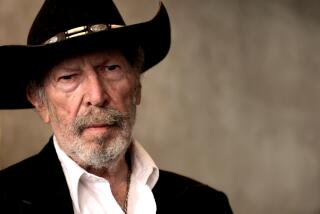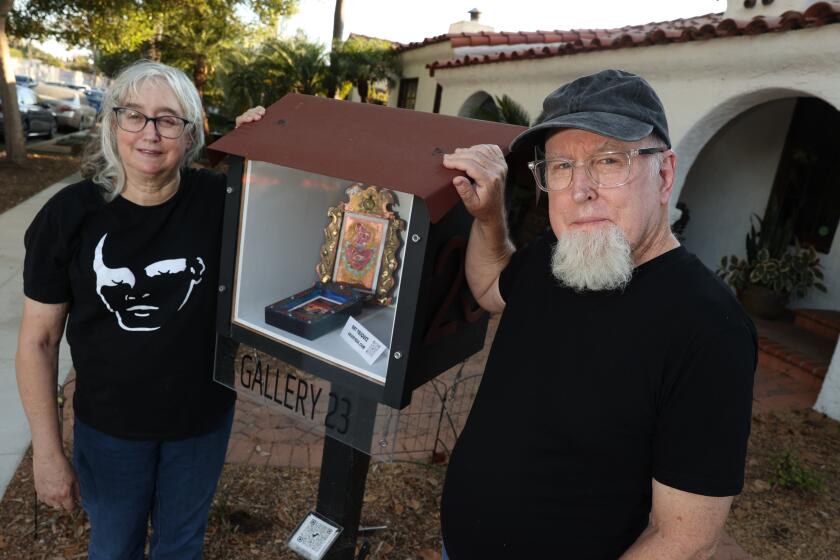‘P.S.: Further Thoughts From a Lifetime of Listening’ by Studs Terkel
Studs Terkel, who died last month at the age of 96, was America’s most popular oral historian.
Though never a “writer” of the first rank, he nevertheless was a unique contributor to American letters and a vital link to the current of idealistic indigenous radicalism that once enlivened it. “P.S.: Further Thoughts From a Lifetime of Listening” is, as the title suggests, a bit of an afterthought in a long career heavy with well-deserved honors that included a 1985 Pulitzer Prize for the iconoclastic “The Good War” and a definitive popular history of the Great Depression, “Hard Times.”
This posthumously published collection is what might be called in conventional terms a miscellany, which, the author says in a characteristically charming preface, was culled by his son, assistant and “caretaker” (his wife of 60 years, Ida Goldberg, died in 1999) from fragments in his workroom. It includes a bang-up interview with James Baldwin, conducted shortly after the writer’s return to the United States from long exile in France; another standout conversation with songwriter Yip Harburg (“Brother Can You Spare a Dime”); a couple of transcripts of key radio broadcasts; and sketches, most autobiographical, done for the magazine published by the radio station on which his interview program aired five days a week for more than 40 years.
There’s an unconventional but sentimentally touching Christmas story-- set in the lobby of one of the hotels Terkel’s immigrant Jewish parents ran after coming to Chicago from New York. (His Russian-born father was a tailor too sickly to pursue his trade; his mother a onetime circus performer from Poland.)
Another includes this sequence:
“I did have a glancing acquaintance with the garage where the St. Valentine’s Day Massacre occurred. (I glanced in one day, looking for Upsadaisy Connors. He was a sometime mechanic -- and at times a soldier for the Mob -- who owed my mother six months’ rent coming to about $200. He had disappeared. Some weeks later, he was found floating down the drainage canal. A slight misadventure. My mother wore sackcloth and ashes. At least $200’s worth. Happily, all was not lost. I inherited his silk dressing gown. It was similar to the one worn by Clark Gable as Ace Wilfong in ‘A Free Soul.’ Fortunately, Upsadaisy was my size, not Gable’s. Unfortunately, Norma Shearer was not around. As I looked into the mirror, a study in subdued scarlet with thin black stripes, I missed Norma. Though she may have been slightly cockeyed and, as Lillian Hellman observed, had a lovely face unclouded by thought, I missed her terribly. Oh, well.)”
Through a window
Good as the Baldwin interview is -- and it’s first-rate -- the small jewel at the heart of this collection is a personal review of that perennial Chicago Art Institute favorite, Edward Hopper’s “Nighthawks” from 1971:
“The scissor-faced customer, his seared companion, and the bone-weary counterman hold you; the slightly hunched back of the loner, whose face evades you, haunts you forever. Yet, that alone isn’t what Hopper is about. It is the light that is the hero. Or is it the darkness of the street outside? One is artificial, the other is natural; both are given equal weight. As Alexander Eliot observed, ‘The dark is less lonely.’ Here are all the open-all-nite beaneries you have ever experienced. Here is everyman’s lonesome valley. . . .
“The cold of the city was touched by Hopper as by no American painter, before or since. The woman, nude or half-dressed, usually near the window, was his most intimate human.
“Hopper once said that truth in art is what’s truly modern, so that ‘Giotto [could be] as modern as Cezanne.’ It certainly makes Hopper infinitely more contemporary than any Now you can name. Renewed wonder and humility -- the artist’s own phrases -- are what he’s all about.”
There’s much to argue about in that appraisal (and the usual leavening of Midwestern defensiveness) but nothing that doesn’t command consideration and a great deal that’s sturdy and honestly edifying.
Everyone’s story
The interesting thing about the oral history that elevated Terkel from a local, albeit well-loved, radio personality to bestselling author and national literary celebrity is that he came rather late to the game -- and it wasn’t his idea. It’s hard to recall, now that nearly every research library and university in the United States and Britain has one or more oral history projects in process and the genre’s techniques have been codified, that the term “oral history” first appeared in 1948 in a New Yorker profile. The subject was a fixture of Manhattan’s literary bohemia by the name of Joe Gould, who claimed to be writing the world’s longest book, a history of the contemporary world told through the voices of ordinary people. In fact, Gould’s book never was published, and it’s doubtful a manuscript ever existed.
The term, however, caught on, and the concept exploded in the 1960s, when fashionable left-wing politics suddenly led historians to realize that the human story had a “Rashomon” structure and could be told as relevantly from below as above. (Or, to borrow the sentiment from Rainsborough, one of the proto-republicans in Cromwell’s army, “The poorest He in England hath a life to lead as the greatest He.” It is the habit of obvious truths to hide in plain sight, awaiting “discovery.” Jan Myrdal’s “Report From a Chinese Village” piqued the interest of André Schiffrin, Pantheon Books’ legendary publisher and editor-in-chief, and he prodded Terkel to undertake a similar project from the streets of Chicago.
Schiffrin made a shrewd choice in Terkel. He had a decent man’s interest in the lives of others, a probing but gentle curiosity and an intuitive grasp of what psychotherapists would come to call “active listening.” He was streetwise by background and, though he’d imbibed his radicalism straight from the heady air of Chicago’s famously raucous and contentious Bughouse Square, he wasn’t one of the legion of autodidacts it produced. He’d studied philosophy at the University of Chicago and graduated from its law school. He knew things.
Terkel was blacklisted in the early 1950s and emerged from the experience unbowed and un-embittered. His radicalism was of the old native sort. It did not flirt with notions of creating new men to inhabit worlds reformed into perfection; it simply asked the American nation to live up to its ideals, so that its people might express their goodness. As Terkel once told an interviewer: “I’ve always felt, in all my books, that there’s a deep decency in the American people and a native intelligence -- providing they have the facts, providing they have the information.”
Rutten is a Times staff writer.
More to Read
The biggest entertainment stories
Get our big stories about Hollywood, film, television, music, arts, culture and more right in your inbox as soon as they publish.
You may occasionally receive promotional content from the Los Angeles Times.










